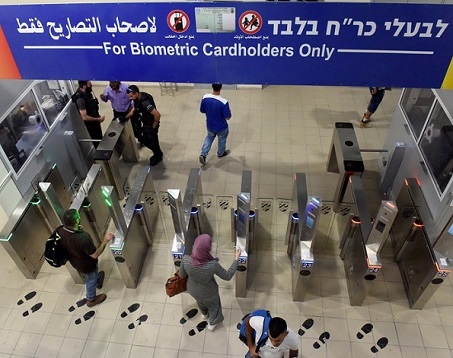Nora Barrows-Friedman
The Electronic Intifada / March 30, 2020
Following sustained pressure by Palestinian rights activists, technology giant Microsoft has announced it is divesting from an Israeli surveillance firm.
AnyVision has been supplying biometric facial recognition technology to Israeli army checkpoints that separate the occupied West Bank from Jerusalem and present-day Israel.
Microsoft said on Friday that as well as divesting from AnyVision, it will now end minority investments in firms that sell facial recognition technology, in order to allow “greater oversight and control over the use of sensitive technologies.”
The corporation’s divestment is “an important victory for tech justice activists and the international community in solidarity with the Palestinian people,” said Lau Barrios of the social justice group MPower Change.
“At a time when our civil rights are being threatened by authoritarian regimes with access to technology like AnyVision’s facial recognition systems, to have Microsoft walk away from funding them is huge,” said Granate Kim, communications director at Jewish Voice for Peace.
Microsoft’s divestment comes less than a year after it announced that it was pouring $74 million into AnyVision.
Human rights activists jumped into action.
Jewish Voice for Peace, together with the Palestinian Boycott, Divestment and Sanctions National Committee, MPower Change, the American Friends Service Committee and corporate watchdogs SumOfUs and Ban Facial Recognition, began the #DropAnyVision campaign to compel Microsoft to pull its funding from the firm.
Activists noted that investing in AnyVision was an explicit violation of Microsoft’s principles.
The corporation has stated that it would “advocate for safeguards for people’s democratic freedoms in law enforcement surveillance scenarios and will not deploy facial recognition technology in scenarios that we believe will put these freedoms at risk.”
Responding to pressure from activists and an NBC report on AnyVision’s use of facial recognition software, Microsoft hired the law firm of former US Attorney General Eric Holder in November to audit AnyVision.
At the time, Microsoft clarified that if any violations of its principles were discovered, it would “end our relationship” with AnyVision.
In turn, AnyVision claimed that its security installations had been “examined and confirmed” against Microsoft’s ethical principles.
Meanwhile, petitions created by the #DropAnyVision campaign collected more than 75,000 signatures, which were hand-delivered to Microsoft’s headquarters in January, according to Jewish Voice for Peace.
“Microsoft’s decision to dump AnyVision is a huge blow to this deeply complicit Israeli company and a success for an impressive BDS campaign led by Jewish Voice for Peace,” said Omar Barghouti, co-founder of the Boycott, Divestment and Sanctions Movement for Palestinian rights.
“Israel’s war crimes against Palestinians, with the complicity of many corporations like AnyVision, continue despite the threat of the coronavirus, so our resistance to them and our insistence on freedom, justice and equality cannot but continue,” Barghouti added.
AnyVision denies mass surveillance
Tel Aviv newspaper Haaretz reported last summer that AnyVision has a secondary project that is “much more confidential and includes facial recognition technology” not just at checkpoints between the West Bank and Israel, but “with cameras deep inside the West Bank.”
NBC also reported in October that AnyVision “powers a secret military surveillance project throughout the West Bank” separate from the checkpoint installations.
That project “was so successful that AnyVision won the country’s top defense prize in 2018,” according to NBC.
“During the presentation, Israel’s defense minister lauded the company – without using its name – for preventing ‘hundreds of terror attacks’ using ‘large amounts of data,’” NBC added.
Claiming AnyVision is “the most ethical company known to man,” its chief executive told NBC News he knew nothing about the surveillance program and threatened to sue NBC.
Elyon Eshtein “disputed that the West Bank was ‘occupied’ and questioned the motivation of the NBC News inquiry, suggesting the reporter must have been funded by a Palestinian activist group,” NBC reported.
Holder’s law firm confirmed that AnyVision technology is used at checkpoints, but said it could not confirm that it was being deployed for mass surveillance inside the West Bank.
Nora Barrows-Friedman is a staff writer and associate editor at The Electronic Intifada, and is the author of In Our Power: US Students Organize for Justice in Palestine (Just World Books, 2014)













